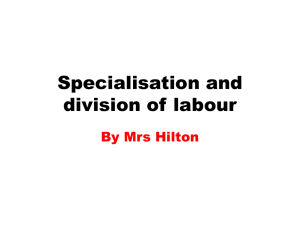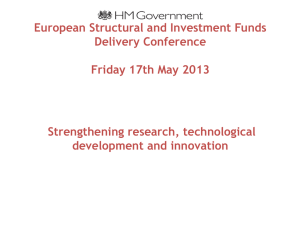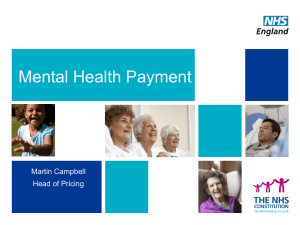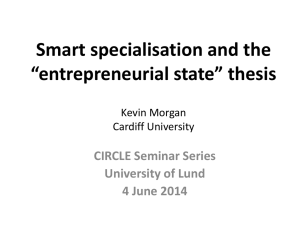Jan Larosse - EWI Flanders
advertisement
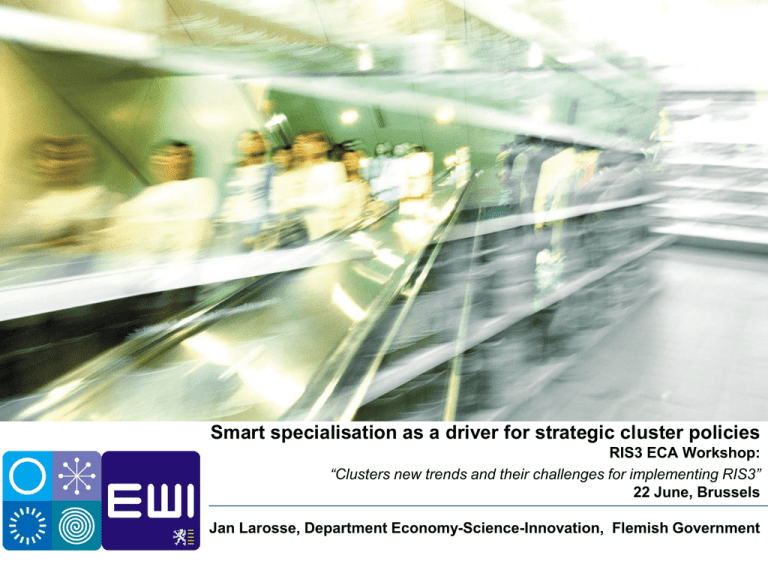
Smart specialisation as a driver for strategic cluster policies RIS3 ECA Workshop: “Clusters new trends and their challenges for implementing RIS3” 22 June, Brussels Jan Larosse, Department Economy-Science-Innovation, Flemish Government Overview An argument in three steps: 1. The OECD Project on smart specialisation: a new policy approach 2. The evolution of cluster policies in Flanders: a new strategy 3. Main features: clusters are key components in S3 First conclusions Recent changes: cluster policy becomes core of new industrial policy The role of OECD ‘action studies’ in our policy development Cluster policies in times of structural change: a paradigm shift? S3 in the context of the financial-economic crisis New challenges for cluster policies Cluster policies and cluster management need to develop new strategic capacities to play their role in the governance of transformation of the present growth model 2 Flemish government | Department of Economy, Science and Innovation 1. OECD Project: ‘Smart specialisation for innovation-driven growth’ • The OECD started June 2011 the first integrated policy learning project to support design and assessment of strategies for smart specialisation (in cooperation with DG Regio & IPTS) Basic structure: 1. 2. • ‘Base-line’: develop evidence-based strategic intelligence to assess present specialisations and priorities (measurement) ‘Beyond the base-line’: design discovery driven strategy processes to enable future choices (case-studies) Objectives Manageable and consistent policy tool box for policy makers (OECD Innovation Policy Platform) Policy recommendations to use smart specialisation for leveraging smart growth • Key Concepts Smart specialisation is largely about the policy process to select and prioritise fields or areas where a cluster of activities should be developed: let entrepreneurs discover the right domains of future specialisations (‘an entrepreneurial discovery process’) ‘Regional development’ holds a central place, but takes an international viewpoint of discovering comparative advantages (= ‘open’ regional innovation system) What is smart? A knowledge-based, interactive and pro-active strategy development 3 Flemish government | Department of Economy, Science and Innovation Structure and Expected results PART 1: What is the Baseline ? Workshop 1 22-24 Nov. 2011 PART 2: Beyond the Baseline ? Workshop 2 10-11 May, Paris Workshop 3 Brussels, end-2012 Indicator-based Specialisation Profiles for strategic monitoring of international comparitive advantage (in science, technology, employment, export) Governance Templates for (self)-assessiment of capacities in priority setting, participatory processes, INDICATORS-BASED strategic intelligence. TEMPLATE GOVERNANCE Case-studies TEMPLATE for comparative policy learning on CASE-STUDIES smart/interactive strategy development as an ‘entrepreneurial discovery process‘ (‘Action learning’) Policy synthesis REPORT on the role of smart specialisation as a new policy approach for FINAL co-creation of ‘direction’ in the transformation of the economy Flemish government | Department of Economy, Science and Innovation Participants : 13C – 16 regions -17 CS Austria Finland Regional policy mixes Germany Inter-regional Cross-cutting competences Multi-governance and lead markets innovation strategy Belgium Nano for Health Sustainable Chemistry The Netherlands Multi-level governance Poland Low-tech manufacturing sectors Spain Aerospace Regional industrial policy UK Low Carbon Vehicles South Korea Photonics Industry Turkey Automotive sector Czech Republic Estonia Australia Rural research and Development activity Lead countries (Case-studies + final report) Case-studies Joined later: Slovenia, Tcheque Republic Flemish government | Department of Economy, Science and Innovation Example of an economic specialisation profile: mature industries in Flanders Even these simple spider graphs can trigger other ‘stories’ and inspire new strategic decion frameworks Source: OECD project Smart specialisation in global value chains (ECOOM) 6 Flemish government | Department of Economy, Science and Innovation Preliminary findings OECD has a role in setting ‘standards’ to accelerate conceptual and policy development and support policy makers with a ‘toolbox’ of indicators en guidelines: 1. Smart specialisation is a policy approach for prioritisation of (public) RD&I investments in times of hard budget constraint and structural change. = 4-Cs 1. 2. 3. 4. CHOICES COLLABORATION / CONNECTIVITY / CROSS-FERTILISATION COMPARATIVE ADVANTAGE, capitalising on COMPLEMENTARITY in value chains CHALLENGES 2. Smart Specialisation Strategies are developed in a multi-actor and multi-level policy environment = Clusters (as nodes in global value-chains) are the engine 3. Strategic governance has to be adapted to the climate of uncertainty in decentralised decision environments = Discovery process, aided by shared strategic intelligence & supporting methodologies for co-creation of shared visions, road maps, 7 Flemish government | Department of Economy, Science and Innovation S3 are co-created at different decision levels • Actor Level Choice process Collaboration • Cluster Level The 4 C-s Competitve Advantage Challenges 8 • Regional Level • International Level Flemish government | Department of Economy, Science and Innovation SMART SPECIALISATIONS: where to ‘discover’ them? POLICY MIX DEMAND-SIDE SOCIETAL CHALLENGES Norms & Standards Public procurement SUPPLY-SIDE MISSIONS Education/R&D/ Training INTERNATIONAL COMPETENCE CENTRES LEAD-MARKETS comparative advantages combing strong local competences SMART SPECIALISATIONS in innovation crossroads with future value chains Smart Specialisation is focussing local competences on gobal challenges 9 Flemish government | Department of Economy, Science and Innovation SMART SPECIALISATION STRATEGY: focus on lead-clusters POLICY MIX DEMAND-SIDE Value Chain Development SOCIETAL CHALLENGES SUPPLY-SIDE Products Solutions Systemen Norms & Standards Public procurement INTEGRATION LEAD-MARKETS MISSIONS Education/R&D/ Training INTERNATIONAL COMPETENCE CENTRES comparative advantages combing strong local competences SMART SPECIALISATIONS in innovation crossroads with future value chains GOVERNANCE CLUSTER PLATFORMS LEAD CLUSTERS INCENTIVES LOCAL ATTRACTIVINESS …Therefore smart specialisation is embodied by innovation clusters as unique local eco-systems in global value chains. 10 Open Innovation Competence Development Flemish government | Department of Economy, Science and Innovation Catalysing role of strategic intelligence • Shared visions • Common Road Maps • • • 11 Specialisation profiles to help identify comparative advantages (evidence-based) Road Maps Specialisa tion Profiles Ecosystem design Promote clusters with unique eco-systems that exploit the positive sum game of open innovation Smart Specialisation Strategy Giving a role to all regions Flemish government | Department of Economy, Science and Innovation 2. Recent evolutions in Flanders cluster policies 12 • Flanders has a tradition of strong bottom-up S&T policy: selection only on quality standards (‘excellence’ and ‘ROI’), but no clear thematic or sectoral priorities • But history has created specialisation patterns! Often institutionalised (strong strategic research centres) or evolved from FDI (decided by multinationals). • Smart specialisation approach can catalyse change process: recognise the entrenched priorities (historic strengths that are not always strengths anymore) • It is a process approach, not a mechanism for top-down choice policy. The bottleneck = strategic capacity (strategic cluster platforms!) • S3 in Flanders = no strong ex ante choices but a commitment to travel the road of transformation by targeted innovation Flemish government | Department of Economy, Science and Innovation ‘Innovation Crossroads’: challenge driven innovation policy ‘Innovation Centre Flanders’, concept note adopted by Flemish Government on May 27th 2011 • • • Societal challenges recognised as driver of a new innovation strategy Departure from a purely bottom-up research and innovation policy Six ‘innovation crossroads’ are identified for the development of specific innovation strategies • • 13 Eco-innovation Green energy Sustainable mobbility and logistics Innovation in care Social Innovation Industrial transformation (specified for core sectors) ‘Innovation crossroads’ are a space where interdisciplinary research and open innovation can contribute to societal and economic value creation. ‘Innovation Direction Groups’ are assigned by the Minister to advise on such strategies (ongoing) Flemish government | Department of Economy, Science and Innovation Transformation processes: core of New Industrial Policy ‘White Paper New Industrial Policy’, adopted by Flemish Government on May 27th 2011: • Action Plan with 50 Actions in economy-innovation-work policy for a ‘new productivity offensive’, ‘Factory of the Future’ and ‘system innovation’ Round Tables are organised to elaborate a ‘Strategic Action Plan’ for transformation in (ready) sectors. ‘Transformation strategies’ are based on value chains, clusters and grand projects (cross-sectoral) New arrangements for policy coordination are gradually put in place • A targeted cluster policy will be developed (advised by an Industry Council). ‘Smart specialisation’ is adopted as a reference. This is a ‘discovery process’! Strong bottom-up drive. • Frontrunner: FISCH (Flanders Initiative for Sustainable Chemistry) From 2007 onwards the sector federation developed a transformation strategy, supported by a broad mobilisation (more than 700 participants), in 3 parts: a strategic research programme on renewable materials and process intensification; open innovation infrastructures; new business models (e.g. chemical leasing) and sustainability criteria. Recent establishment of Transformation and Innovation Platform as cluster organisation (€5mln/y) that elaborates the road maps further. 14 Flemish government | Department of Economy, Science and Innovation A three steps entrepreneurial discovery process 1.Visioning: with focus on societal challenges (transition management / starting experiments) in Transition Arenas / Flanders in Action Vision 2.Strategy development: with focus on transformation by innovation (strategies within the 6 innovation hubs) Strategy in Innovation Direction Groups 3.Action plan: Action with focus on investment projects Plan in consortia driven by frontrunners (promoted in Round Tables and Transformation and Innovation Platforms) 15 Flemish government | Department of Economy, Science and Innovation Smart Specialistion case-studies Flanders (OECD-TIP project on smart specialisation in global value chains) Action Learning= simultanious policy learning and policy development Two transformation cases that benefit from a smart specialisation approach: Case 1: Sustainable Chemistry Largest petro-chemical cluster in Europe in Flanders; strong links with food, building e.o. sectors; cross-border links with NL and DE Transition towards bio-based economy, but incomplete science base! How to become a world-class cluster in sustainable chemistry? Focus on strategic road mapping for a transition (also cross-border!) Case 2: Nano-for-Health IMEC: largest independent nano-electronics research institute in Europe; technology platform for open innovation, but weak industrial cluster. Health: transition towards ‘personalised therapy’ How to leverage this technology platform for these new application areas? Focus on the management of an emerging eco-system (cross-border!) 16 Flemish government | Department of Economy, Science and Innovation 3. Conclusions for cluster policy • Clusters are change agents! No lobby organisations or disguised sector organisations Locus for choice processes linked with innovation & entrepreneurship! = smart specialisation • Pitfalls of ‘steady-state’ cluster policies Lock-in! / The ‘average’ member as a reference Dispersion: small-scale; fragmentation and duplication Focus on cooperation between cluster organisations is not enough • Transition towards a strategic approach towards regional strengths Frontrunners in the drivers’ seat for a pro-active & interactive strategy New methods and personnel in cluster management (road mapping) Need for competition in cluster models (Spitzen cluster competition?) Smart specialisation is a policy approach for a new generation of cluster policies 17 Flemish government | Department of Economy, Science and Innovation Three stage cluster development GENERIC CLUSTER POLICIES TARGETED CLUSTER POLICIES Clustering Cluster platforms Lead Clusters • Co-location / agglomeration • Value chains • Occasional collaboration • Organised • Triple helix • Systematic use of synergies • Strategic • Smart specialisation • System innovation ‘Two-stage gate keeping’ policies for cluster development? 18 Flemish government | Department of Economy, Science and Innovation Impact of S3 on cluster management • • • • • • Take smart specialisation as an opportunity to enhance change management in cluster strategies. Transformation pressure is not the same for all. Different smart specialisation strategies: modernisation, diversification, transition, radical foundation. Consider what is the appropriate governance. Smart specialisation introduces the international positioning as a selective environment for own priorities, to challenge present distribution of priorities. Outward looking strategy Align these strategies with common road maps at EU-level. Use cross-border linkages to complete/complement the regional clusters and gain critical mass. Focus on lead-clusters. Network clusters in GVC and in European knowledge base for common challenges (see Nano for Health network) S3 = ‘specialisation’ (focus on strengths), enhanced by strategic capacity and intelligence to facilitate future choices in cluster organisations 19 Flemish government | Department of Economy, Science and Innovation Further questions? Please contact me! Thank you Department of Economy, Science and Innovation (EWI) Koning Albert II-laan 35 box 10, 1030 Brussels www.ewi-vlaanderen.be | info@ewi.vlaanderen.be Jan.larosse@ewi.vlaanderen.be / tel 32-2-5535993
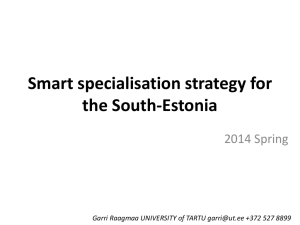
![[I-2] Mahr](http://s2.studylib.net/store/data/005533114_2-575c16bb39129d77e4fc404ccab7077e-300x300.png)
